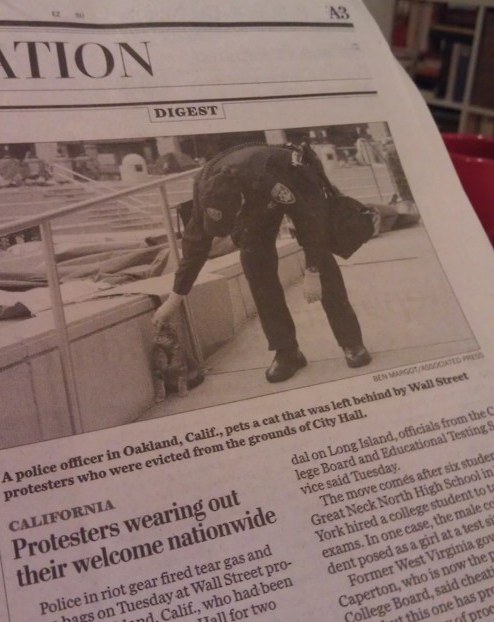So, I had not realized until I got a twitter-prompt from Kiona Strickland that so much time had passed since I put out my call for opinions on what one would need to successfully do academic research outside the confines of traditional academia.
The call was put out in the context of my own goal of incorporating as a non-profit called the Ronin Institute to pursue my own scholarship.
A remarkable number of people shared extensive and thoughtful comments. I hope to respond directly to each of you quite soon as well.
Responses came from people who are already functioning outside of academia, people who are thinking about doing so, and people who are successful and reasonably happy professors at this or that institution.
There were a huge number of specific things that came up in the responses, but they seemed to cluster around the following five things:
1) Money
2) Library access
3) Colleagues
4) Legitimacy
5) Infrastructure
It occurs to me that each of these needs points to the fundamental role of universities are resource aggregators. By that I mean that they facilitate what in economic terms would be called “economy of scale” (or in voodoo complexity science terms “emergence”). I’ll take each one of these in turn.
1) Money. This is of course, the biggest thing that many scholars are worried about, especially these days. You’ve found something that you love. You’ve gained enormous expertise in it. Quite possibly, there is some particular thing (maybe a behavior in some species, or a period of history of some specific location) on which you have become the most knowledgable person in the world. It seems like you ought to be a way to turn that into a paycheck, right?
Fundamentally, we all have to work within the constraints set by how much funding there is out there to support scholarship in a particular area. You can total up the budgets of then NSF, private foundations, and so on, and it provides a sort of upper bound on what can be supported. In many fields, there is the perennial problem of over-production of PhDs, which is constantly putting pressure on this upper bound, but that’s a post for another day.
Within those constraints, an independent scholar has to deal with two things. First, the money available for their research may not be enough to live on. Second, their grant support may fluctuate over time. In most fields, universities help with the first by creating ways to subsidize your scholarship through teaching or other activities. If you are, for instance, a clinical researcher in a university hospital, you may have an arrangement where the less grant money you have, the more time you spend treating patients.
Universities help to address the inevitable fluctuations in grant support by effectively averaging financial support across individuals and over time. I may have a grant shortfall this year, but they keep paying my salary (at least nine months of it). Presumably, this is, on average, compensated by the overhead they take in when I do have grant support, from the classes I teach, and from donors who are impressed by the prestige of my department.
It is not obvious to me that the Ronin Institute will be able to do much of anything on this front, unless I win the lottery. However, I believe that it could serve as a hub for communication among independent scholars, many of whom might have more creative ideas to share.
2) Library access. Access to scientific journals and books is an absolute necessity for any real scholarship. Here, the resource aggregation is perhaps most obvious. A university will typically have institutional subscriptions to a huge number of academic journals, and affiliation with the university gives you access to those journals. University libraries also usually have huge number of “books,” which are sort of like the web, but printed out on paper.
 |
Legend has it that in an era before the invention of the blog, people used to buy, sell, borrow,
and occasionally read books. Image via Wikipedia. |
This, again, is something that would be difficult for the Ronin Institute to replace. Fortunately, there are work-arounds available to many independent scholars. For books, many universities have mechanisms to make their collections open to the public. You’ll want to contact the school(s) closest to you to find out.
For most scholars, the most important thing, though will be electronic access to the journal articles, preferably via some mechanism that works while you’re at home in your pajamas. The trick is to acquire some sort of (non-paying) affiliation with a university. You might be able to use your alumni status do this with your alma mater, or you might be able to arrange some sort of adjunct or visiting position with a university close to you.
3) Colleagues. The most valuable resource that universities aggregate is people. At a university, you can be surrounded by people who care about things as obscure as the things you care about. You get continually exposed to new ideas both in formal settings like seminars and in informal ones like waiting in line for a latte. Some of these colleagues may then become collaborators.
It is easy, I think, for an independent scholar to recede into isolation. Your research can suffer from a general lack of intellectual stimulation. It can become sloppy if you are not being challenged by smart people who have expertise that overlaps with and complements your own. And, of course, some of the most interesting projects are those that integrate knowledge, expertise, and ideas from different areas. Those projects will absolutely require strong communication or collaboration among multiple people with different backgrounds.
 |
| Being an independent scholar has the potential to be a lonely existence, even if you do have a balloon. |
Then, of course, there’s the purely social / emotional component. For most of us, being a truly independent researcher would be a terribly lonely and unsatisfying existence. I think we all need someplace where we can go and say something like, “I’m so sick of working on this grant proposal,” or, “You won’t believe what Reviewer 3 wants me to change,” where people will get it.
In principle, this is an area where the Ronin Institute could make a contribution. It could serve as an online hub where independent scholars can share their ideas and experiences, maybe even find collaborators. What do you think? If there were a reasonable online community of Ronin, would you participate? Do you imagine that it would help?
4) Legitimacy. This, to be honest, was one of my primary motivations. If you submit a grant proposal or paper from your home address, the reviewers are probably not going to take you seriously. It’s a shame, but the fact is that most reviewers are going to be traditional academics themselves, and may be instinctively distrustful of alternative careers.
This, again, is a place where the Ronin Institute might be able to contribute something. I am leaning towards creating a mechanism through which independent scholars could acquire some sort of affiliation with the Ronin Institute. This would come with an e-mail address and the ability to cite the Ronin Institue as an institutional address. My instinct is that if you have a way of publishing under a university address (e.g., as an adjunct professor or visiting scholar), that will benefit you more, but who knows. I’m still weighing the pros and cons on this one, and am trying to think about just how open the affiliation would be. In any event, it would probably be somewhat restrictive at the beginning, as I would want to limit the numbers for logistical considerations, at least to start.
5) Infrastructure. The last thing that universities provide is all the other people and stuff that you could never have on your own. This includes grant administrators, accountants, clerical support, IRBs, etc. It also includes equipment. In the experimental sciences, it might be expensive lab equipment, which only makes economic sense when it is shared among three labs, each of which has fifteen or twenty grad students, postdocs, and technicians working there. Even if your work is primarily theoretical or computational
This is an area where the Ronin Institute could, in principle, contribute. It is conceivable that, in the future, independent scholars could run grants through the Ronin Institute, and the overhead from those grants could support one or more people who could administer the grants. Similarly, maybe it could pool money to pay for shared software licenses.
This is not anything that is going to happen anytime soon, however. If a sufficient (and sufficiently active) community grows here, though, it is something that we might consider a few years down the road.
 |
| The Hall of Doom would have been difficult for any one supervillain to afford on his or her own. |
In the meantime, we might be able to compile a list of resources, ways to access those science-y things that you need occasionally, but could not possibly hope to own.
Next Time:
As you might expect, many of the responses also focused on all the things that don’t work for them in traditional academia. That will be the next update.













